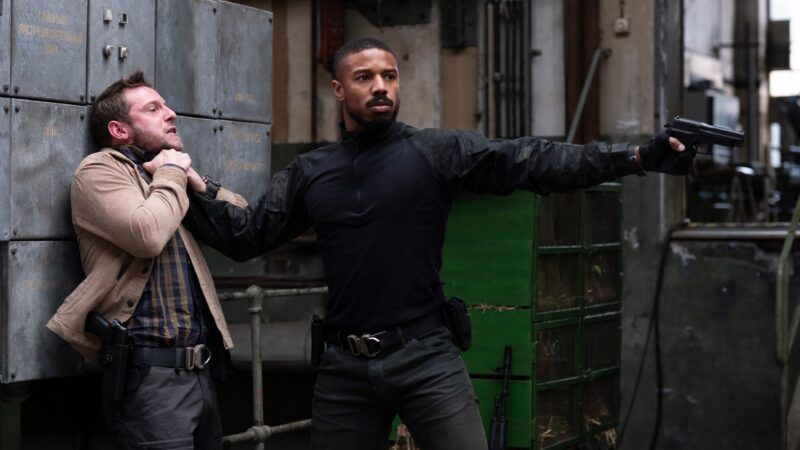A Keynesian Warmonger Gets What He Deserves in the Otherwise Awful Without Remorse
A terrible, Tom Clancy-inspired action movie that ends in a lame speech touting war as economic stimulus.

I don't have much good to report about Without Remorse, but I will say this: It's a movie where the Keynesian warmonger turns out to be the bad guy—and gets what he deserves.
Before I spoil the end of this movie, an action thriller on Amazon Prime Video loosely adapted from a 1993 Tom Clancy novel, let me pre-spoil it with this: You don't need to get to the end, because it's a terrible movie, saved only occasionally by an all-in, relentlessly physical performance by Michael B. Jordan, as longtime Clancy hero John Clark.
But if you do get the end (and again, spoiler alert) you'll be treated to a monologue by Guy Pearce, playing the Secretary of Defense, who explains that he's been trying to foment a war with Russia by—actually it doesn't matter, but all the nefariously convoluted stuff that happens in the movie, including a hit that resulted in the death of the hero's wife—in order to bring Americans together and pump up the economy.
"You know who won World War II?" he seethes, in one of those explain-your-evil-plan monologues that villains in bad movies often give about eight minutes before the credits roll. "It wasn't the generals or the admirals," he says. "It was the economists."
During World War II, he tells Jordan, the government purchased tanks, planes, ships, trucks, and other industrial goods. "All that spending lifted this entire nation out of poverty." There's also a throwaway line or two about how an external threat can bring together a politically divided nation. Sure.
As if letting innocents die in hopes of starting a massive war wasn't bad enough, Pearce proves his ultimate villainy by mansplaining macroeconomics and political polarization to the hero. He sounds less like a secretary of defense and more like a Twitter reply guy.
Not surprisingly, Jordan kills him rather violently pretty much immediately after that. It's fairly satisfying, as these things go.
It's a popular myth, of course, that World War II government spending was primarily responsible for pulling America out of the Depression and kick-starting a midcentury economic boom; in fact, the war was incredibly costly (as war usually is) and diverted resources away from the productive economy. That some bureaucratic D.C. bigwig would both buy into that myth and cite it as inspiration for a cockamamie plan to bring Americans together and boost the economy is probably the most believable thing about the movie.
The rest of it involves a series of often inscrutable moves and countermoves by both the military and intelligence community, as they attempt to rescue an American asset from Russian captivity, which then appears to spark a series of attacks on American soil—one of which results in the death of Clark's wife.
Following her death, Clark hunts down a Russian diplomat and murders him in the drop-off lane outside Dulles airport by setting his car on fire, then shooting him several times during an interrogation. It's certainly harsh, but honestly it might not be worse than having to navigate the terminals at Dulles.
Clark ends up in jail long enough to beat up some guards and be conveniently rescued by a U.S. marshal who then disappears for the rest of the movie. (The kludgy screenplay by Taylor Sheridan and Will Staples often saves Clark from certain doom through coincidence rather than through his own ingenuity.)
After some dutiful exposition, the story takes a long detour to Russia for an apartment-bound action sequence featuring snipers, vest bombs, exploding police cars, and all sorts of other ordnance. Despite many, many explosions, the whole setpiece manages to be extraordinarily boring.
The apartment shootout should be the movie's highlight, but it's just a dour, dull, slog. Director Stefano Sollima shoots the sequence (and the rest of the movie) in flat, visually indistinct compositions, and never musters any energy or urgency for the action. It has all the drive and tension of a weeknight trip to Harris Teeter.
Watch out for those snipers! Hmmm, a new flavor of Doritos?
This important character is wearing a bomb with a dead man's switch! Do you think they'll notice if I have 11 items in the 10 items or less lane?
Anyway.
The only upside to the movie is Michael B. Jordan's seething, intense performance. Watching him psych himself up to fight a flotilla of armored prison guards is one of the movie's best moments, because it relies on his energy alone, not anything engineered by the director or screenwriters.
Jordan deserves a big, exciting action franchise, but this disappointing dud isn't it, even if there is a mid-credits sequence teasing a sequel.
Like so many bureaucrats and lawmakers in D.C., Without Remorse makes promises it can't keep. Even the title is misleading; after two hours of indifferently staged buildup to a crappy speech by a nefarious D.C. politico, I'm pretty sure there will be a lot of remorse—yours.


Show Comments (73)